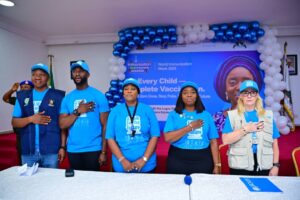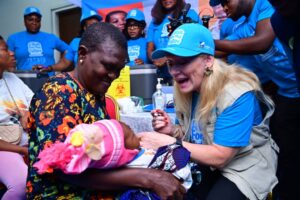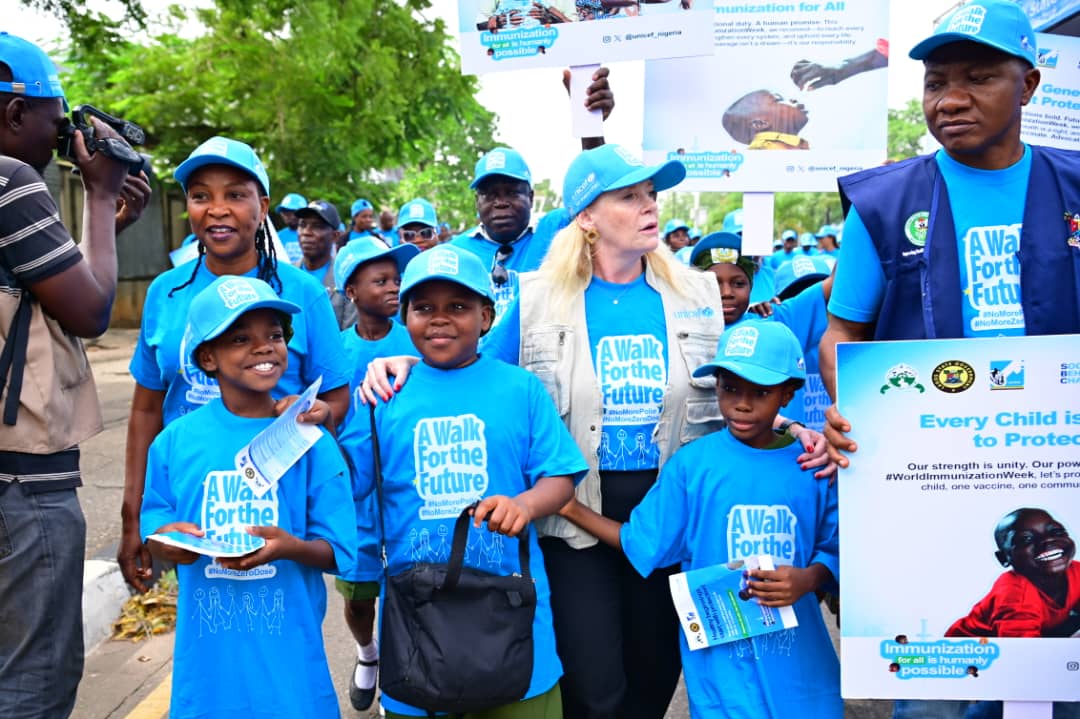The Lagos State Government in partnership with UNICEF held a symbolic ‘Walk for Polio’ on Tuesday, as part of activities marking the 2025 World Immunization Week and Polio Week. The event was aimed at mobilizing stronger public and political commitment to end vaccine-preventable diseases in Nigeria.

The Advocacy Walk, which took off from the Office of the Lagos State First Lady in Alausa, Ikeja, and ended at the State Secretariat, brought together an impressive array of dignitaries including the First Lady of Lagos State, the Wife of the Deputy Governor, the Commissioner for Youth and Social Development, UNICEF’s Chief of the Lagos Field Office Celine Lafoucriere, as well as traditional rulers, religious leaders, youth leaders, influencers, and members of the media.
Speaking at the event, Lafoucriere explained both the progress and the persisting gaps in the fight against polio and other vaccine-preventable diseases.

“This World Immunization Week and our Walk for Polio reminds us how far we’ve come, but also how far remains to go. Today, 2 million Nigerian children are still zero-dose — meaning they’ve never received a single vaccine,” she stated.
She highlighted that vaccines have saved over 150 million lives globally since 1974, equivalent to saving six lives every minute over the past five decades and stressed that the oral polio vaccine alone has prevented 24 million cases of paralysis worldwide.
Despite these successes, Lafoucriere warned of a dangerous resurgence of polio in Lagos, fuelled by low immunization coverage, poor sanitation, and malnutrition. “We already have the tools. These vaccines are safe, effective and proven. But misinformation and limited routine access continue to undermine our progress.”
She therefore called for an urgent shift from reliance on periodic vaccination campaigns to a more sustainable system of routine immunization: “Routine immunization must become the norm for every child born in Lagos. Only then can we establish a reliable vaccination calendar and ensure that every child is protected.”
Lafoucriere reaffirmed UNICEF’s commitment to supporting Lagos and Nigeria by delivering vaccines to hard-to-reach communities, training frontline health workers, and building trust through grassroots engagement.
Also speaking, the First Lady of Lagos State, Dr Ibijoke Sanwo-Olu, issued a passionate call to action, urging all Lagos residents to embrace immunisation as a basic human right and a shared responsibility in safeguarding children’s health.
Dr Sanwo-Olu maintained that immunisation should not be viewed as a privilege for a few but as a right every child is entitled to, regardless of background or location.
Highlighting upcoming interventions, she announced that Lagos State would actively participate in the National Immunisation Plus Days from Saturday, May 3 to Tuesday, May 6, 2025. During this period, all children between the ages of 0 and 59 months will receive two drops of the oral polio vaccine free of charge.
“Vaccination teams will be stationed in public health centres and will also conduct house-to-house visits, covering schools, markets, religious centres, and other public places,” she said, urging parents and guardians to cooperate fully. “Your participation is crucial. We need everyone involved to keep our children safe.”
Supporting the First Lady’s call, Dr Chinenye Okafor, World Health Organisation State Coordinator, issued a sobering warning: “If hard-to-reach children remain unvaccinated, Nigeria risks exporting preventable diseases to other countries. We must stand together and fight misinformation.”
Adding to the urgency, Dr Segun Emiju, State Coordinator of the National Primary Health Care Development Agency, echoed that immunisation is a fundamental human right. “Access to vaccines must be universal. Every child, no matter where they live, deserves a healthy start in life.”
The event served not only as a walk but also as a call-to-action, with political leaders, community influencers, and every stakeholder asked to make routine immunization top on their advocacy list.

